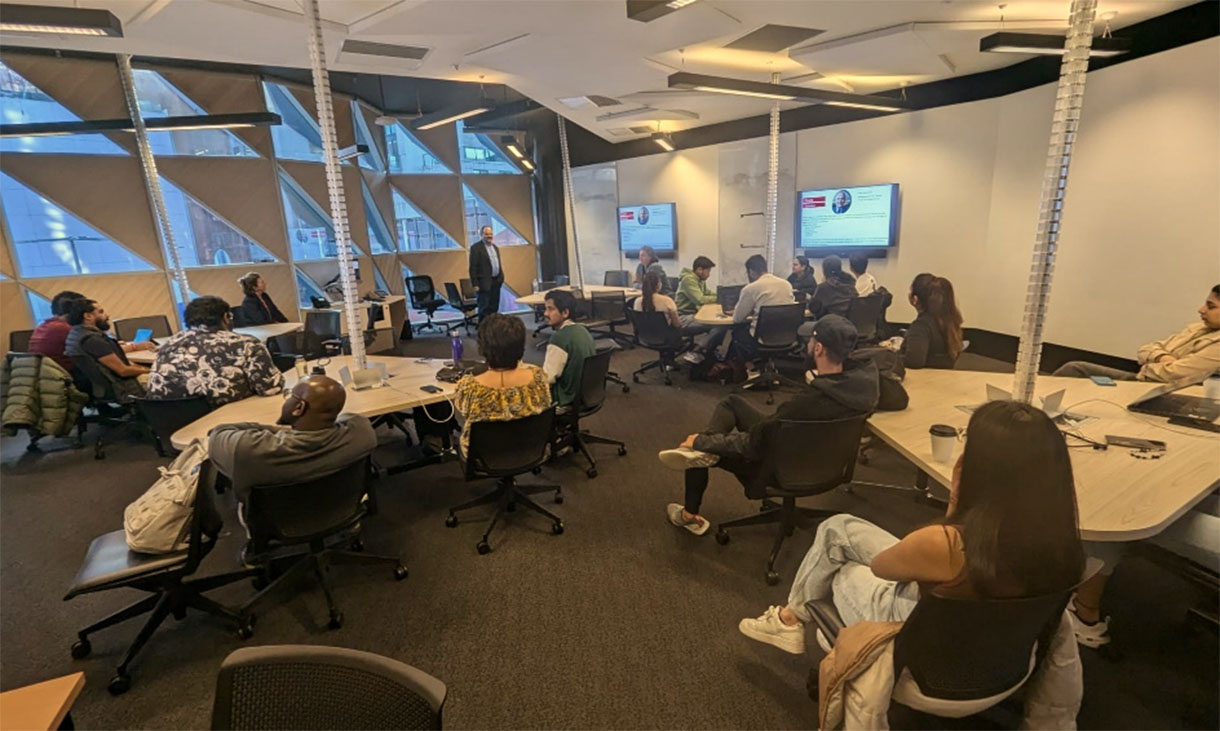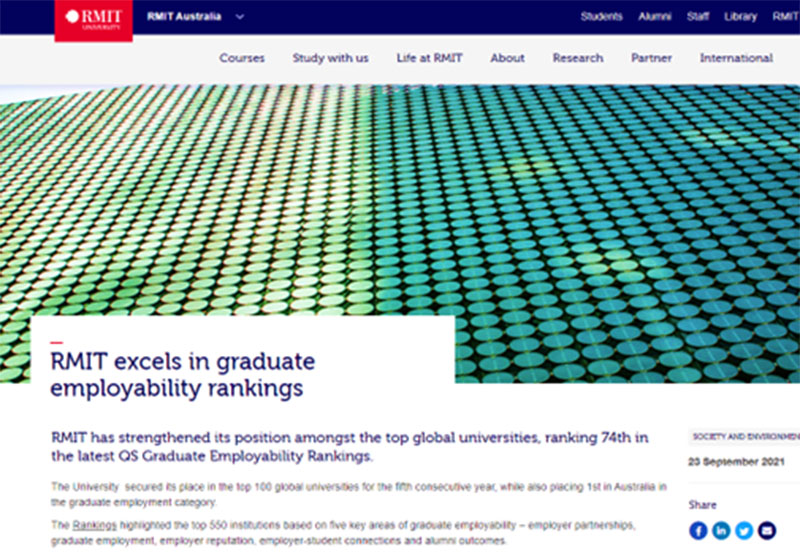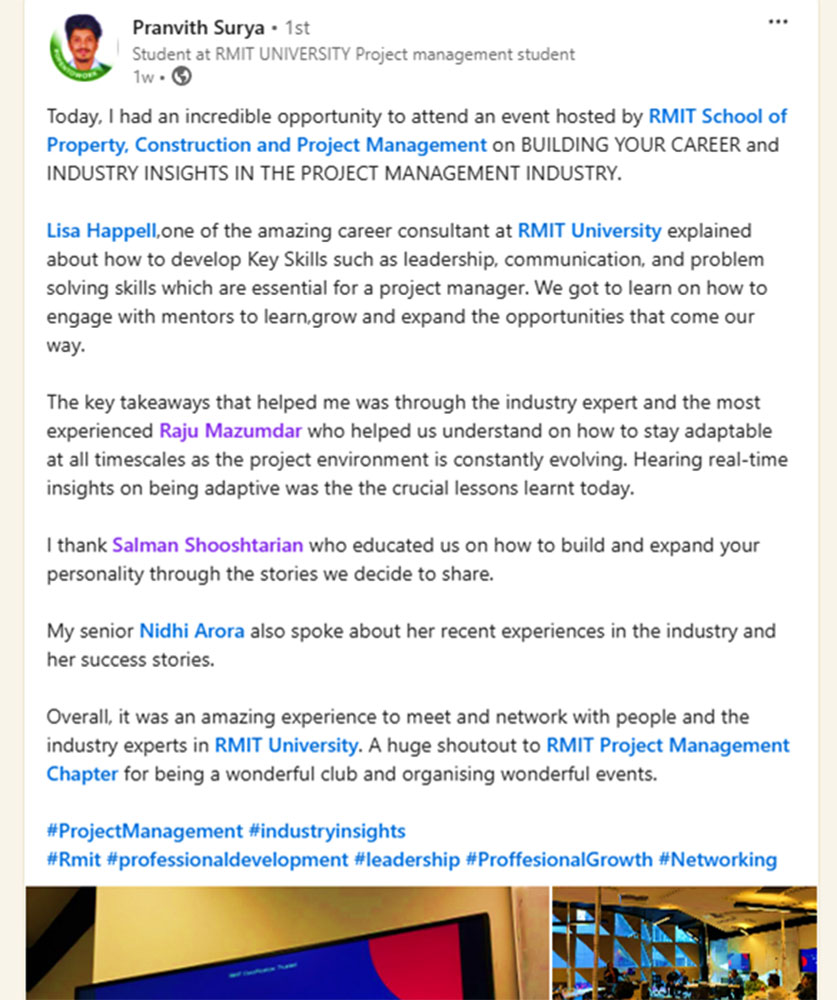International students struggle to secure employment in today's competitive job market. Can teaching staff do more to support them and reinforce RMIT and PCPM initiatives?
Story by Salman Shooshtarian
On the evening of October 10th, PCPM hosted a career event titled "Build Your Career: Industry Insights for the Built Environment." This session was integrated into Week 10 of the Project Management Practice postgraduate course (BUSM1278) and specifically targeted international students, focusing on the cultural aspects of the job-seeking process in Australia. The event was well-attended and provided valuable insights from two guest speakers: an experienced industry professional (Mr Raju Mazumdar) and a career consultant (Lisa Happell) from the RMIT Careers and Industry Experience team (Figure 1). Together, they offered practical advice on how students can adapt their job search strategies to improve their employability within the Australian job market.
Earlier this year, while teaching this course in Semester 1 of 2024, I noticed that international students often struggle to gain local industry experience in Melbourne. Throughout the course, which explores various project management knowledge areas, I make it a point each week to introduce different project management specialties alongside the regular lecture content.
 Figure 1. Mr Mazumdar shares his local industry insights with the session attendees. Source: author
Figure 1. Mr Mazumdar shares his local industry insights with the session attendees. Source: author
These specialties include roles such as project recovery manager, functional manager, time scheduler, risk manager, and others. The purpose of this approach is to demonstrate to students the diversity of the project management profession and how the skills they acquire are directly aligned with industry needs and trends. To further reinforce this connection, I refer to local job posting platforms such as Seek and Indeed, showing students real examples of the demand for the expertise they are developing through their qualifications (see Figure 2).
 Figure 2. An example of a position advertised at Seek.com.au inviting applications for a consultant with expertise/knowledge of business recovery; project recovery is covered in Week 7 of BUSM1278. Source: www.seek.com.au
Figure 2. An example of a position advertised at Seek.com.au inviting applications for a consultant with expertise/knowledge of business recovery; project recovery is covered in Week 7 of BUSM1278. Source: www.seek.com.au
 Figure 3. RMIT ranks the best Australian university in terms of graduate employability (QS Graduate Employability ranking 2022). Source: www.rmi.edu.au
Figure 3. RMIT ranks the best Australian university in terms of graduate employability (QS Graduate Employability ranking 2022). Source: www.rmi.edu.au
 Figure 4. An example of a LinkedIn post shared by one of the session’s attendees.
Figure 4. An example of a LinkedIn post shared by one of the session’s attendees.
From their verbal feedback, I gathered that students found this activity highly beneficial, as it broadened their perspectives on future career opportunities. RMIT is nationally recognised as one of Australia’s leading universities for student and graduate employability, and the School’s management team and teaching staff provide a reasonable level of support to achieve this. According to the latest statistics, the University secured its place in the top 100 global universities for the fifth consecutive year, while also placing 1st in Australia in the graduate employment category (QS Graduate Employability 2022).
In particular, RMIT and the School of Property, Construction, and Project Management (PCPM) provide exemplary, long-standing initiatives such as career fairs, career workshops, 1:1 consultations and Visa sessions facilitated by the Careers and Industry Team, PCPM’s Employer of Choice and Job Shop.
In this context, I began to consider how I could further contribute, within my capacity as a university lecturer, to support and complement the efforts of the PCPM initiatives. Specifically, I wanted to explore how I could help international students navigate the challenges they face in securing employment in Australia. This motivation prompted me to explore the current issues related to international students employability. Some obvious issues were easy to identify: the job market, a few years post-COVID-19, isn't as robust as before; students and graduates face limited options due to the visa restrictions; and the industry tends to prefer hiring permanent residents. However, some issues may go beyond these external factors and involve internal ones, particularly the approach students use in their job search. Although many postgraduate international students possess overseas work experience, navigating the Australian job market remains a challenge. This, combined with rising living costs, has put additional pressure on students, potentially affecting their academic focus.
As an international student myself once, I can see both sides of the story. To me, entering a new context means adapting to new norms, communication styles, and self-marketing methods—essentially, understanding the cultural nuances. While Australia is known for being multicultural and diverse, I still believe in the saying, "When in Rome, do as the Romans do." After discussing this issue with the Project Management Discipline management team (Professor Tayyab Maqsood, Associate Professor Tiendung Le and Dr Omid Haass), I decided to organise a career session in my course in Semester 2 2024. With support from the RMIT Career Success team and PCPM’s Partnerships and Engagement advisor, Mr. Daniel McLinden, we focused on the cultural aspects of the job-seeking process. I also invited Mr. Raju Mazumdar, an industry expert with extensive local knowledge, who has worked across both government and industry sectors in Australia, to provide valuable insights.
The process involved several brainstorming meetings with the guest lecturers to discuss, identify, and highlight key tips that could help international students present the best version of themselves. Overall, the session was a success, and post-session feedback from attendees indicated how valuable it was in addressing this gap, supporting them in their job-seeking journey. At the institutional level, this session was a demonstration of the School of Property, Construction, and Project Management's commitment to supporting students from diverse cultural backgrounds, in alignment with RMIT University's Mission. On a personal level, it was a deeply fulfilling experience, as it aligns with my life mission to empower individuals to make a meaningful difference in their lives and the environments in which they live and work.


